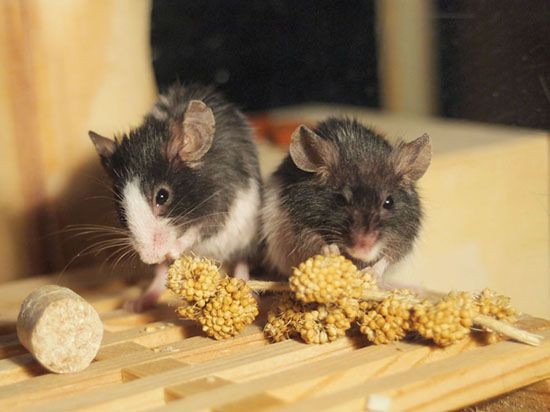Gay Mice? Females Without Serotonin Display Homosexual Preference

The development of homosexuality is mysterious. The idea of a "gay gene" has been thrown around unconvincingly for decades, and evidence seems to be building around epigenetic factors that shape sexual preference.
A new study published in the journal Proceedings of the National Academy of Sciences (PNAS) throws another kink in the works, suggesting that the neurotransmitter serotonin (5HT), which is typically associated with mood, plays an important role in determining sexual preference.
Female mice that were bred to lack serotonin or central serotonergic neurons much preferred the company of other females, choosing to sniff the genital odors of female mice instead of male mice, and showing a significantly higher rate of same-sex mounting behavior than wild-type females without the serotonin-lacking mutation.
The female mice without serotonergic neurons still responded to sexual attention from male mice, but when given a choice, it was clear to the researchers that they had a sexual preference toward other females.
Researchers Shasha Zhang, Yan Liu, and Yi Rao of Peking University in China wrote that the reversal of sexual preference in the female mice could not be explained away by defective processing of olfactory, or scent-sensing, signals — the change was "more consistent with a central mechanism of 5HT in controlling sexual preference."
Tellingly, the genetic manipulation did not involve changes in levels of any sex hormones, like estrogen or testosterone, suggesting that serotonin signaling is specifically implicating in directing sexual behavior.
The results, they concluded, suggest "that serotonergic signaling is involved in controlling sexual preference in adult females."
Interestingly, the same scientists discovered in a previous study that shutting off serotonin activity in male mice turns off their specific sexual preference toward females.
Does Serotonin Keep People From Turning Gay?
It's important to note that this is not a study that can be simply extrapolated to people. Slapping human identity labels like "gay" or "lesbian" onto mice is misguided — we can watch the mating behavior of these animals, but we can't determine how they would self-identify.
There is also not much indication that human sexual preference can be pinned down to a simple neurotransmitter difference. Serotonin is a remarkably complex hormone implicated in a wide variety of human functions in all people, from sleep to mood to sex. While there is evidence that serotonin-boosting drugs like SSRIs have libido-dampening effects, it's unclear that they have any influence over sexual preference. Anyone looking for a "gay cure" won't find it here.
Finally, it should be clarified that the serotonin alterations were genetic — suggesting that, at least for these mice, sexual preference is something they were born with, not something that changed later in development.
Researcher Simon LeVay of Stanford University speculated on the study's findings to the New Scientist, suggesting that "serotonin systems may be part of the cascade of signals that translate sex hormone levels during development into sexual partner preference in adulthood."
For what it's worth, popular consensus in the United States seems to be converging around the idea that homosexuality is an innate orientation, not a product of the environment. In a Gallup poll released earlier this month, 47 percent of Americans agreed that sexual orientation is something people are born with — a significantly higher proportion than the 33 percent who believe it is a preference that develops based on upbringing.
Source: Zhang S, Liu Y, Rao Y. Serotonin signaling in the brain of adult female mice is required for sexual preference. PNAS. 2013.
Published by Medicaldaily.com



























